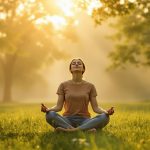
You should consider natural stress-relief methods because they offer effective, side-effect-free ways to enhance your mental and physical well-being. Techniques like mindfulness and breathing exercises can provide immediate relief and reduce stress hormones. Regular exercise releases endorphins, boosting mood and promoting overall health. Spending time in nature or engaging in activities like forest bathing can elevate your mood and lower anxiety. Journaling helps clarify thoughts and identifies anxiety triggers. By making healthy lifestyle choices, you’re building resilience against future stress. Embracing these methods could transform your stress management approach, and there’s much more to uncover about their benefits.
Benefits of Natural Stress Relief
Natural stress-relief methods offer a multitude of benefits for mental health and stress management. With anxiety disorders affecting over 19% of adults in the U.S. each year, embracing mindfulness practices and breathing techniques can become your liberating escape.
Imagine freeing your mind from the clutches of anxiety by simply focusing on your breath or tuning into the present moment. These methods allow you to reclaim control, offering immediate relief from stress.
Mindfulness practices, such as meditation, emphasize living in the now, which can greatly decrease symptoms of anxiety. Breathing techniques, like deep breathing or the 4-7-8 method, activate your body’s relaxation response, reducing stress hormone levels. Incorporating aerobic exercise into your routine can further assist in managing anxiety effectively. Even regular practice can help in reducing daily stress and enhancing overall well-being, demonstrating the power of consistent mindfulness and exercise. Physical exercise has also been shown to be effective in reducing anxiety levels, as it releases endorphins that improve mood and enhance well-being.
Even a short nature break of 10-20 minutes can shift your mood and lower stress immediately, helping you feel more grounded.
Furthermore, these natural remedies don’t require much effort. Whether you’re at a desk or standing in your kitchen, you can take a deep breath and find solace.
Physical Exercise and Stress Reduction
Amid the pressures of daily life, engaging in physical exercise can serve as an effective stress-buster. You mightn’t realize it, but exercising regularly reduces stress hormones, such as adrenaline and cortisol, from raging through your system. When these stress hormones drop, you’re more equipped to feel liberated from the weight of stress. Exercise releases endorphins, which are natural mood lifters, enhancing your overall well-being. Developing tailored exercise routines that fit your lifestyle and preferences guarantees you’re consistently making time for true self-care.
Studies have shown that regular physical activity can contribute significantly to mental resilience, equipping individuals with better tools to handle stress and adversity. Exercise isn’t just about moving your body; it’s about feeling good too. Endorphins, also known as nature’s mood lifters, release during physical activity to elevate your spirits. Whether you prefer heart-pumping aerobic exercises like running or serene yoga sessions, the key is finding what makes you feel empowered.
Building strength through weight lifting can boost your confidence, while the tranquility of Pilates offers soothing relaxation. Incorporating exercise into your daily routine not only enhances hormonal balance but also sharpens cognitive function. You’ll discover increased focus and resilience, better sleep, and more energy—factors that transform your response to stress.
Meditation for Calming the Mind

After you’ve harnessed the power of physical exercise to reduce stress, turning your focus to meditation can further enhance your mental well-being. Harness the potential of mindfulness practices and breathing techniques to calm the mind and nourish the soul. Meditation, a centuries-old practice, brings self-awareness and clarity, revealing the freedom to live authentically. Regular practice can enhance emotional resilience and promote overall mental and physical health. It strengthens your willpower and helps manage anxiety, depression, and mood by changing brain structures and promoting emotional regulation. This practice teaches acknowledgment and management of stress, empowering you with the skills to feel more balanced in everyday life.
Start by setting aside a few minutes daily. Choose from methods like mindfulness or focused-attention that align with your goals. Sit calmly, concentrate on your breath, and gently guide your wandering mind back. Guided sessions can provide structure as you develop consistency and increase practice time over weeks. Let meditation be the key to revealing the path toward a liberated mind and serene spirit. Embrace freedom within.
Journaling to Manage Anxiety
When you’re looking for ways to manage anxiety more effectively, journaling can be a transformative tool. By capturing your thoughts and emotions on paper, you can reduce distress and boost your mood. Journaling allows you to identify your anxiety triggers, providing clarity and control over them.
Incorporating positive affirmations into your journaling practice can further enhance its benefits by shifting your mindset. With heightened self-awareness, you can challenge unhealthy thought patterns and enhance problem-solving skills, leading to a deeper sense of freedom. Studies have shown that journaling reduces anxiety symptoms by up to 30%, making it a valuable addition to mental health practices.
To maximize the benefits, explore various journaling techniques. Freewriting encourages you to jot down thoughts without judgment, releasing your subconscious mind. Expressive writing lets you explore your deepest emotions, promoting healing.
A structured format, like a thought diary, can help you systematically address anxiety. Setting a timer guarantees you dedicate time solely to journaling, creating consistency. Using prompts can guide your entries, helping you focus and uncover hidden insights.
Starting a journaling practice doesn’t have to be intimidating. Choose a format—paper or digital—that feels right for you. Habit stacking, like journaling after your morning coffee, can integrate it seamlessly into your routine.
Reflect on your entries to understand emotions and areas for growth. Embrace journaling as a consistent habit for lasting freedom.
Nature-Based Relaxation Techniques

Embraced by the calming presence of nature, you can access profound relaxation through nature-based techniques. Imagine stepping into a serene forest, leaving behind the chaos of modern life.
Forest bathing, or shinrin-yoku, offers a gateway to unplug from technology and connect with the natural world. By walking mindfully, you immerse yourself in the sights, smells, and textures around you, fostering deep relaxation and mental clarity.
Consider tuning into the symphony of nature sounds—birdsong, rustling leaves, flowing water. These sounds can guide you into a meditative state, melting away stress and anxiety.
Stress can affect gut function, making the pursuit of relaxation an important aspect of maintaining overall health.
Here’s how you can embrace nature-based relaxation:
- Forest Bathing: Take a slow, mindful walk in a forest, disconnect from your phone, and let the tranquility envelop you.
- Nature Sounds Meditation: Close your eyes and focus on the gentle sounds of nature to quiet your mind.
- Green Exercise: Engage in activities like running or cycling in scenic environments, boosting your mood and energy.
- Mindful Walking: Walk slowly, focusing on each step and your connection to the earth.
Liberate yourself from stress and anxiety. Through these techniques, nature offers you a path to peacefulness and rejuvenation.
Quick Techniques for Immediate Relief
In times of stress, quick techniques for immediate relief can often play an essential role. When you’re feeling overwhelmed, you can tap into the freedom that comes from knowing you possess tools for instant tranquility.
Breathing exercises like the 4-7-8 technique can ground you by reducing anxiety, while deep breaths through your nose can flood your body with calming oxygen. If you’re craving more action, engage in physical stretching: a simple twist at your desk or full-body stretch can melt away tension and kickstart blood circulation.
To liberate your mind, embrace cognitive diversions. Laughing out loud or getting lost in a puzzle can bolster your mood, as can the rhythmic chewing of gum.
On days when your senses crave a break, give sensory stimulation a shot by squeezing a stress ball or rub your feet over a golf ball to spark a delightful foot massage.
And, of course, self-care strategies will always stand by your side; even a small act like sipping green tea or dark chocolate indulgence can weave magic by altering stress hormones. Claiming these moments for yourself can transform life’s heaviest load into one you carry effortlessly.
Herbal Remedies and Supplements

Herbal remedies and supplements offer natural paths toward stress relief that many people find appealing. If you’re seeking liberation from stress’s clutches, considering herbal teas and vital oils could be beneficial. Here’s why:
1. Herbal Teas: Imagine sipping on soothing chamomile tea, possibly altering cortisol levels and calming your mind. Many herbal teas, like green tea, contain L-Theanine, a compound known for reducing stress and anger.
The very act of preparing and enjoying tea can become a peaceful ritual, offering tranquility amidst chaos.
2. Herbal Supplements: While some, like St. John’s Wort, claim to reduce anxiety, it’s important to consult with a knowledgeable doctor about possible drug interactions and effectiveness.
These supplements can influence how anti-anxiety medications affect you, so follow medical advice carefully.
3. Aromatherapy: Vital oils such as lavender may uplift your spirit and alleviate anxiety. You can experience their calming power in various ways, from diffusers to direct skin application.
Embrace the freedom to experiment and discover what scents resonate with your unique needs.
4. CBD Oil: Though not containing THC, CBD oil may ease anxiety. However, further research is needed.
It’s important to purchase from reputable sources and consult healthcare professionals, especially in areas where it’s prescribed medically.
Explore these natural pathways and reclaim your peace!
Effective Lifestyle Changes
Taking charge of your lifestyle choices can greatly impact your stress levels. Embracing healthy habits is a powerful way to manage stress and enhance your overall well-being.
Let’s explore how some changes can set you free from the clutches of stress.
Start with exercise and physical activity, a cornerstone of stress management. Engaging in regular exercise reduces stress hormones, releases endorphins, and improves your mood.
Physical activity doesn’t just boost your spirits; it also helps you sleep better and builds resilience against future stressors. It’s about time you make movement a joyful part of your life.
A balanced diet also plays a pivotal role in managing stress. Favor a primarily plant-based diet rich in complex carbohydrates and antioxidants.
These nutrients support your mental health and fortify your immune system. Shedding unhealthy foods lifts a burden off your shoulders, helping you feel lighter and more in control.
Don’t underestimate the power of mindfulness and relaxation techniques. Practices like meditation, yoga, and even laughter therapy bring you into the present moment, reducing anxiety and enhancing relaxation.
Enhancing Social Connections

Besides personal lifestyle changes, fostering strong social connections greatly contributes to stress management and well-being. Engaging in nature experiences can decrease anxiety, boost creativity, and enhance your mood. By participating in outdoor gatherings, you’re not only improving your mental health but also building essential social bonds.
Here are some direct ways social connections, influenced by nature, can impact your life:
- Reduced Anxiety and Stress: Being in nature with others lowers stress hormones, leading to a calmer mind and heightened positive emotions.
- Enhanced Creativity and Problem-Solving: Outdoor gatherings stimulate your mental faculties, making you more creative and effective in tackling challenges.
- Improved Community Well-being: Nature experiences facilitate community interaction, fostering a sense of belonging and boosting collective mental health.
- Better Concentration and Attention: Socializing in natural settings can enhance your focus, making everyday tasks feel less burdensome.
Meeting others in green environments is liberating. Activities like guided nature walks or organizing outdoor picnics offer immediate stress relief.
Such interactions don’t just enhance your mood; they actively counteract the fatigue of modern life. Cultivate strong social connections in natural settings, and you’ll find your mental clarity and sense of freedom markedly improved.
Explore Personalized Relaxation Techniques
Embracing natural stress-relief methods is a transformative journey into the world of mindfulness, physical activity, sensory experiences, and personal reflection. Each avenue offers unique benefits, ensuring that individuals can tailor their stress-management techniques to their lifestyle and preferences.
By adopting mindfulness practices like pranayama breathing and meditation, one can tap into a profound sense of inner calm and mental clarity. Complementing these techniques with physical activities such as exercise or walking can further alleviate tension, promoting a healthier mind and body.
Meanwhile, soothing sensory experiences and nurturing personal spaces cultivate an environment conducive to relaxation.
Personalized relaxation techniques provide a thorough toolkit for managing stress and anxiety. Integrating meditation and mindfulness into daily routines offers not only immediate relief but also long-term benefits like enhanced focus and emotional resilience.
Physical activities not only improve physical health but also greatly alleviate symptoms of anxiety and depression. Engaging in sensory experiences like spending time with animals or enjoying aromatherapy can instantly uplift one’s mood, while personal reflection through journaling and organizing offers clarity and peace of mind.
By weaving these practices into a harmonious routine, individuals can forge a personalized path toward well-being, embracing a life imbued with tranquility and balance.
Through this journey, mindfulness transcends a mere practice, blossoming into a lifestyle that nurtures the mind, body, and soul.














